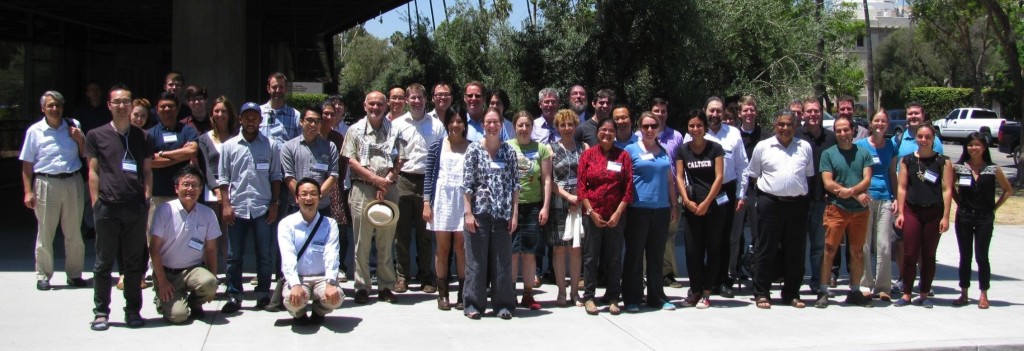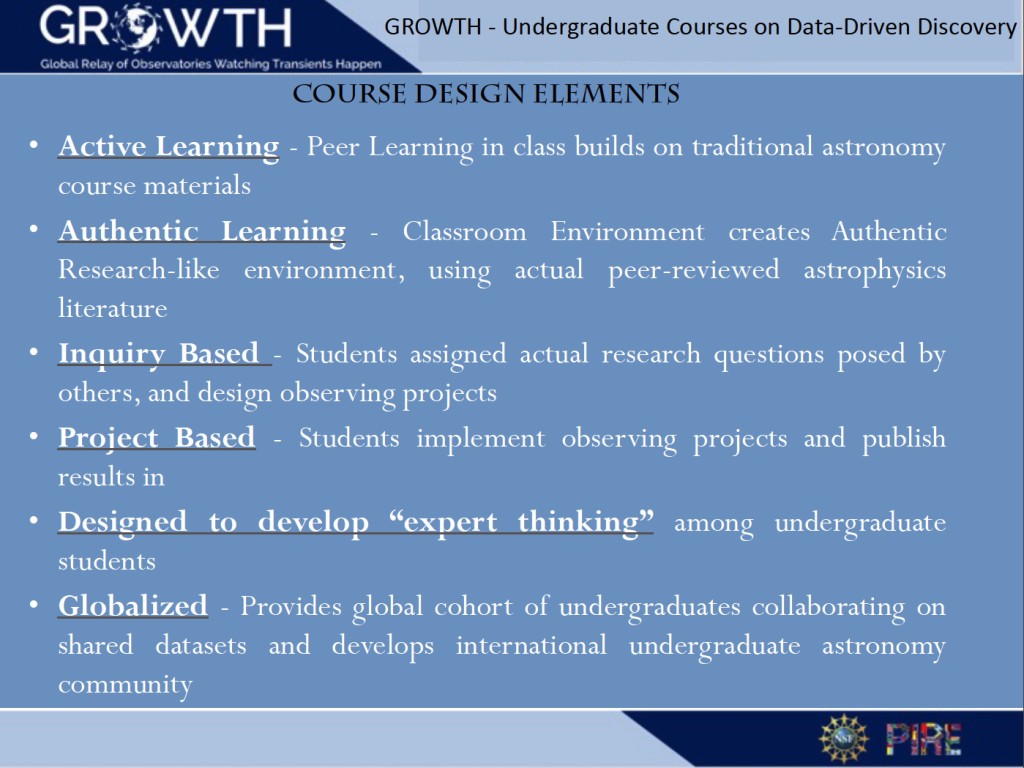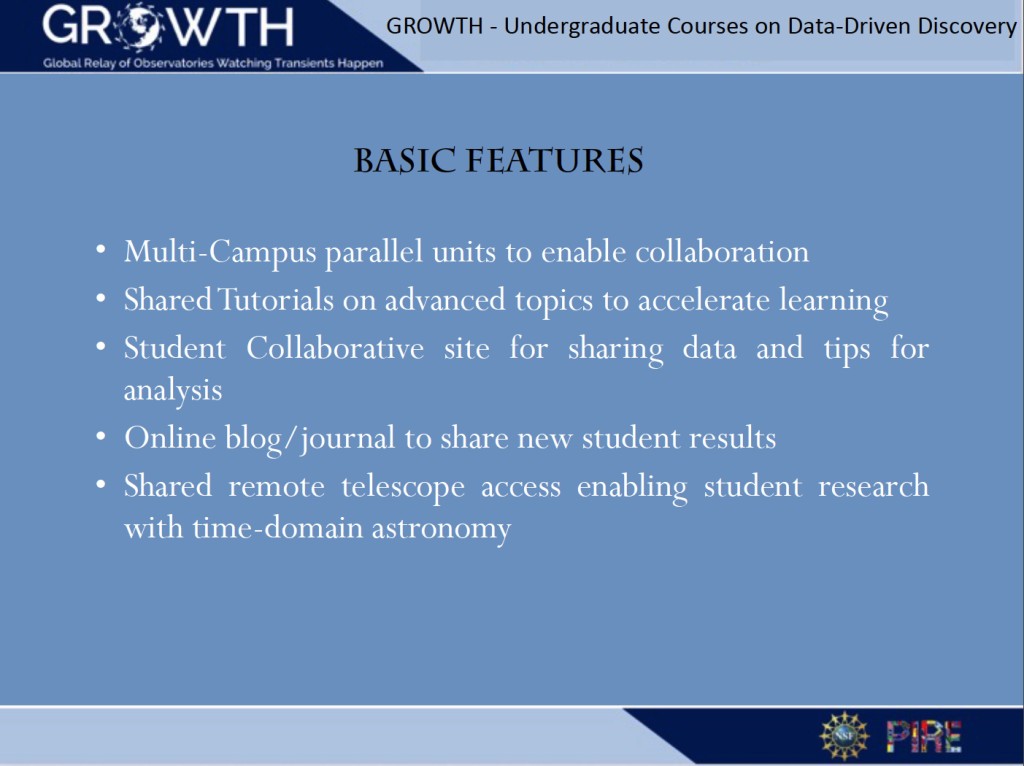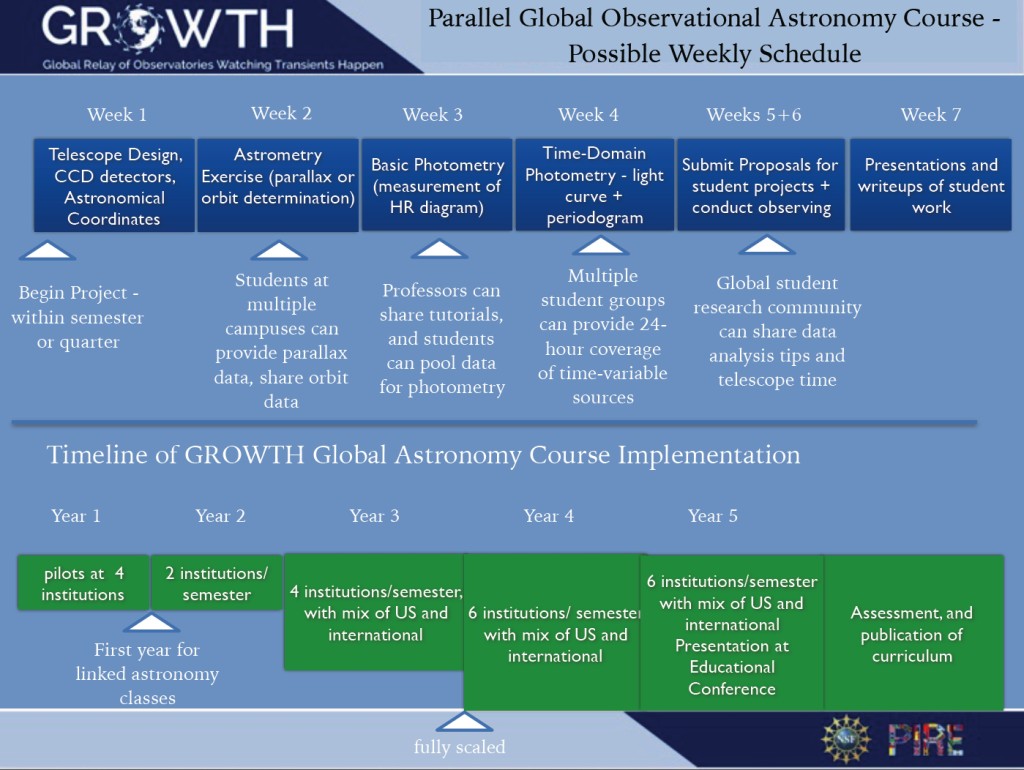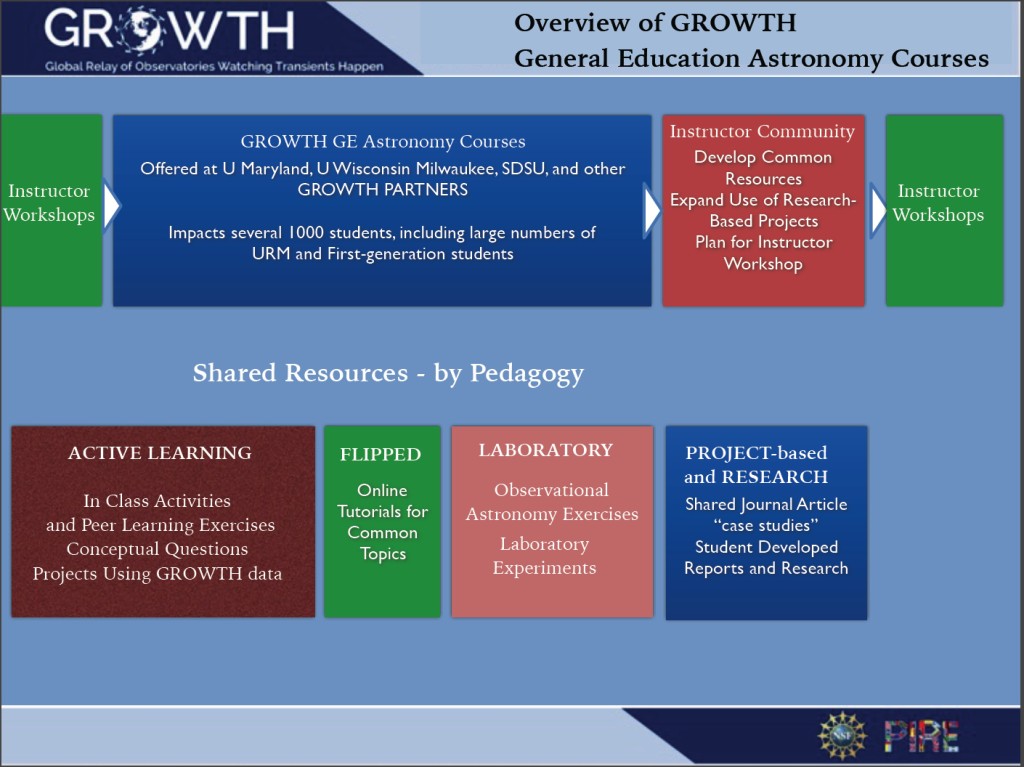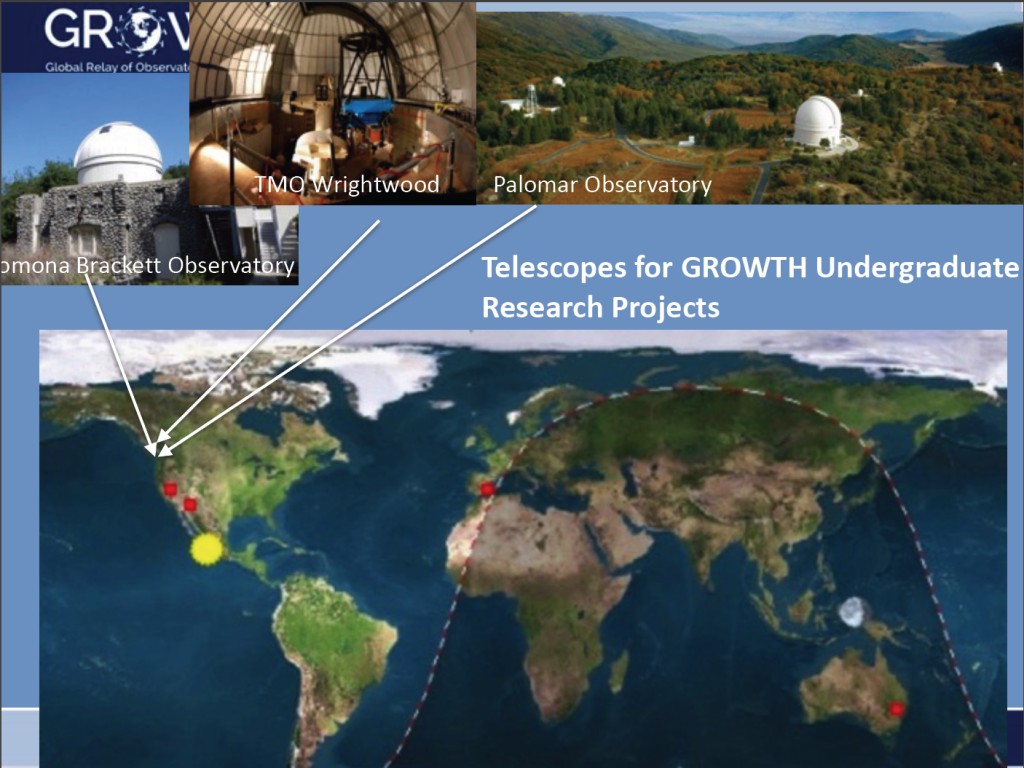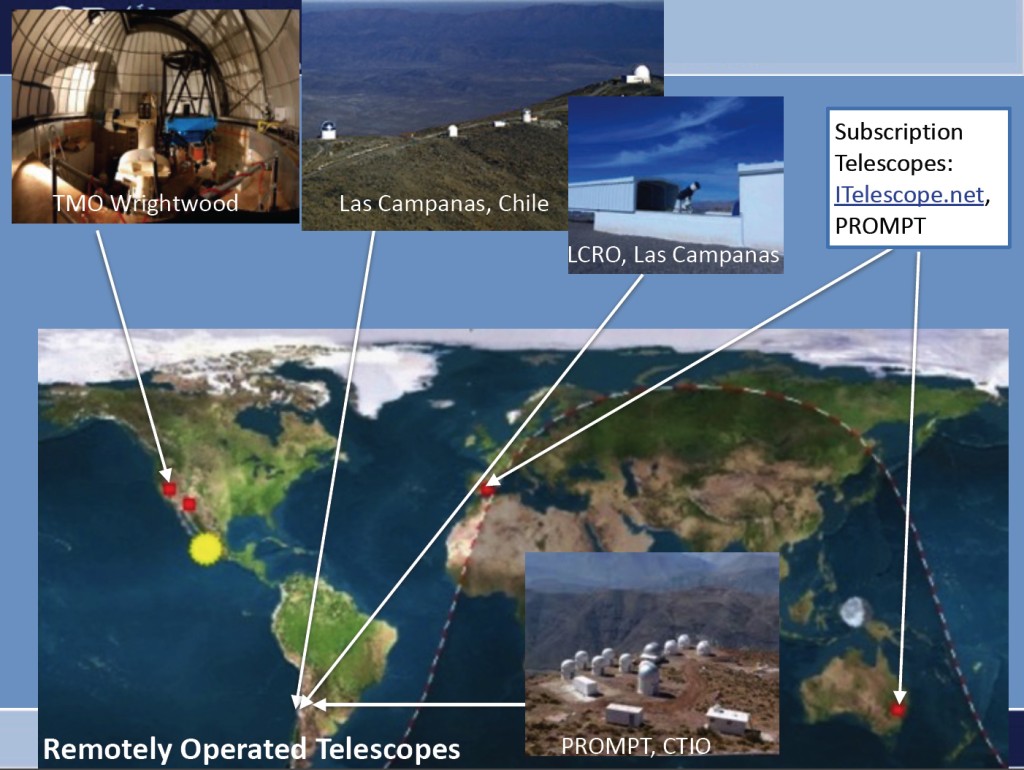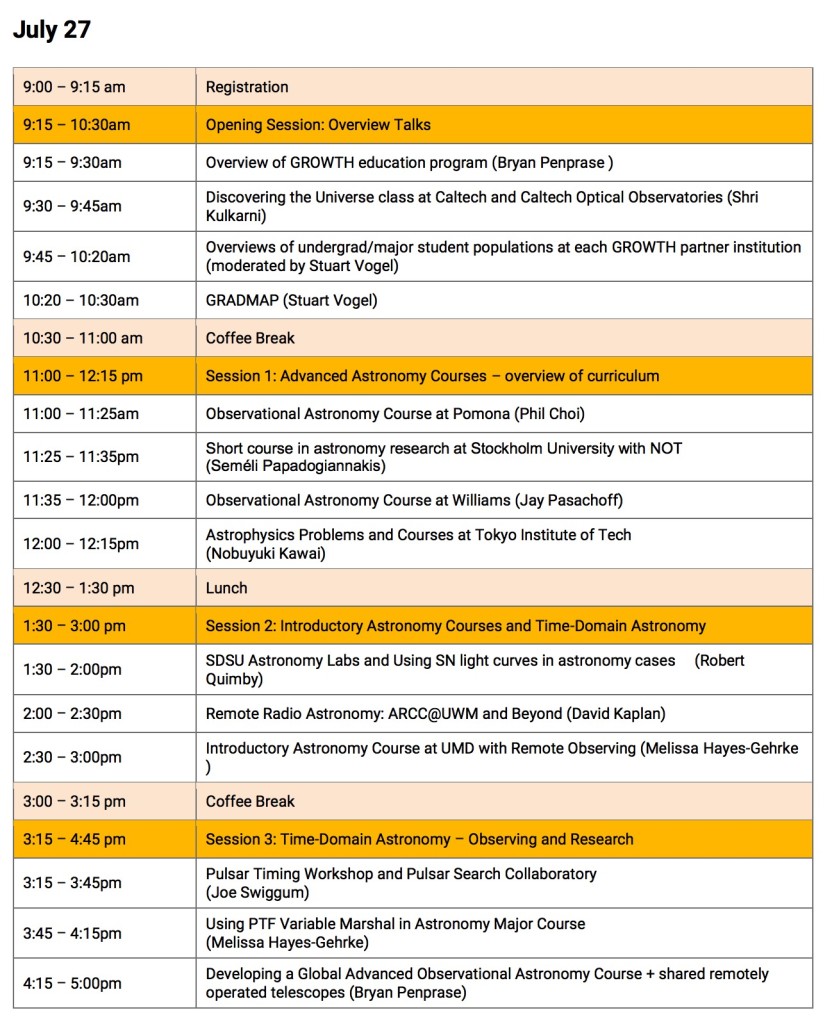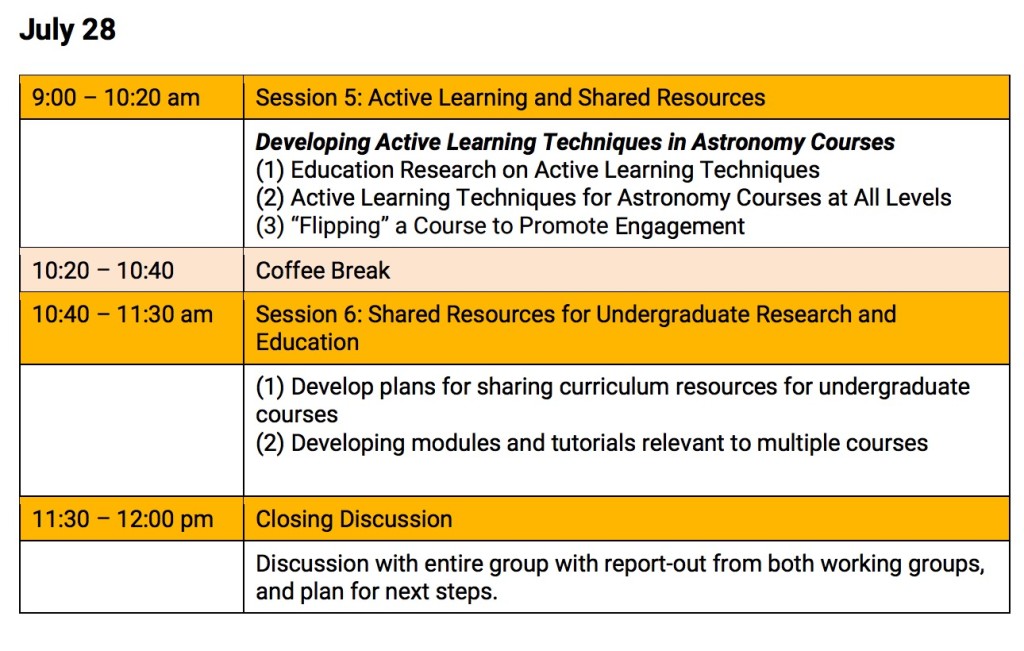The NSF-funded project known as GROWTH includes a strong educational initiative in astronomy and astrophysics. The goal is to create a global community of practice in advanced undergraduate astronomy education, and to developed shared resources for introductory astronomy classes and public outreach. Our educational initiative includes international undergraduate student internships for astrophysics research in over 7 countries, exchanges of graduate students and postdoctoral scholars, and a global exchange of ideas for developing new types of astronomy education. You can read more about this at the GROWTH web site at http://growth.caltech.edu/mission.html.
In the same way that our GROWTH research can benefit from a network of observatories around the world, the GROWTH team can share their exciting new discoveries with students, and as they teach these new discoveries the curriculum they develop can provide an exciting and innovative new curriculum for astronomy. This new curriculum will be an authentic form of science education in which students are themselves collaborating across the earth and sharing new data as they mirror some of the research within the GROWTH team. The entire field of time-domain astrophysics and some of the big-data analysis can also be brought into the curriculum, training the next generation of astronomers in this emerging form of astronomy and astrophysics. The internal site for this project is available at https://sites.google.com/site/growthpire/.
One of the goals for the GROWTH Education Initiative is to link astronomy courses across the US and the world in what is sometimes called a Distributed Open Collaborative Course (DOCC). This format requires instructors to team up and align their course syllabi to discuss the same topics in the same weeks to enable sharing of data by students and to enable common tutorials and training materials. The shared course is given on separate campuses, but students and faculty are linked together electronically by a collaborative platform. We are hoping to launch several of these courses in the coming years, and have brought together a wide range of educators for an educational workshop at Caltech during July 2016. Below is a description of that workshop – which is the first of many events for our GROWTH Educational Initiative.
The GROWTH Educational Workshop – July 28,29, 2016 – Caltech, Pasadena CA, USA
During July 28 and 29, 2016, our GROWTH collaboration hosted the first of its education workshop. This meeting featured attendance by over 30 professors, postdoctoral researchers and graduate students, representing 18 different institutions and five countries. During the meeting we presented innovative courses in astronomy at our campuses, which includes the US institutions of Pomona College, Williams College, Caltech, U. Maryland, U. Wisconsin Milwaukee, San Diego State University, Cal State San Bernardino, and from our international partners, Stockholm University (Sweden), Tokyo Institute of Technology (Japan), IUCAA (India), Yale-NUS College (Singapore), and the University of Western Ontario (Canada).
Our Education Workshop also developed two of our main curriculum tracks. This includes a global observational astronomy course which I am leading and working to link together our students and institutions in a global educational collaborative community. In this new course, teams of students will be linked together to collaborate on their observations of supernovae, asteroids, and other time-variable objects, and the instructors can co-develop educational resources such as tutorials on observational astronomy, guides to accessing datasets and performing advanced “big data” analyses, and guest lectures on advanced topics in astrophysics. I am also eager to develop remotely operated telescopes, such as the new LCRO, as a jointly operated facility that undergraduates around the world can use in their research, even performing many of the same activities as in research telescopes. The hope is that this facility will feature a proposal mechanism, fielded by advanced students, a set of tutorials on usage and data analysis, and even an on-line journal for students to publish some of their findings and ideas. Below is a schematic of the project to develop these courses, as well as a map showing the locations of some of the remotely operable telescopes which will be part of the observations by students in the global astronomy course.
Overview of the GROWTH Educational Initiative – Developing Global Astronomy Courses and Shared Resources
The non-majors course curriculum will also be expanded, and this effort will be centered at the University of Maryland where Stuart Vogel and Melissa Hayes Gehrke are leading classes observing asteroids, and developing curriculum that makes use of the ZTF variable star database, and other exciting new discoveries. This non-majors class has a great potential to widen participation in science among diverse groups of students, including many under-represented minority students and first-generation students. The University of Maryland joins three of the Cal State campuses (SDSU, Cal State San Bernardino, and Cal Poly San Luis Obispo) and U. Wisconsin Milwaukee, as well as our larger group of scientific collaborators. Our education team includes members at several large universities that have substantial populations of students that could be recruited to be part of the next generation of astrophysicists.
The Caltech meeting included a full day of talks sharing curriculum, and innovative observing exercises among our team. We also enjoyed a great workshop on active learning techniques by Melissa Hayes Gehrke on the second day, and a very productive discussion about next steps linking our campuses together in the coming academic year.
Talks at our Caltech GROWTH Education Workshop – July 28-29, 2016. This program is also online at http://growth.caltech.edu/conferences/workshop-program2016.pdf. Our GROWTH website also includes PPT and PDF slides from our GROWTH Education workshop at this site:
http://growth.caltech.edu/conference-2016.html – GROWTH Conference and Workshop site
Program for GROWTH Education Workshop – July 27+28, Caltech, Pasadena, CA, USA
Below are some of the attendees of our GROWTH science meeting and workshop who will be collaborating with us in our educational initiatives. This group includes over 30 GROWTH scientists, representing 18 different institutions and coming from five countries.
| NAME | AFFILIATION |
| Alex Urban | Caltech |
| Ashish Mahabal | Caltech |
| Brad Cenko | NASA-GSFC |
| Bryan Penprase | Yale-NUS College and Pomona College |
| Carol Hood | California State University, San Bernardino |
| David Drew | Claremont Graduate University |
| Hidekazu HANAYAMA | Ishigakijima Observatory, Japan |
| David Kaplan | University of Wisconsin Milwaukee |
| Iva Kostadinova | Caltech |
| Jay Pasachoff | Williams College and Caltech |
| Jessica Sutter | University of Wyoming |
| Joe Swiggum | University of Wisconsin – Milwaukee |
| Louise Edwards | Yale University/CalPoly SLO |
| Mansi Kasliwal | Caltech |
| Martin Elvis | Harvard University |
| Melanie Kae B. Olaes | San Diego State University |
| Melissa Hayes-Gehrke | University of Maryland |
| Nadejda Blagorodnova | Caltech |
| Nobuyuki Kawai | Tokyo Institute of Technology |
| Philip Choi | Pomona College |
| Quan-Zhi Ye | The University of Western Ontario/Caltech |
| Robert Quimby | SDSU |
| Ryan Lau | Caltech/JPL |
| Seméli Papadogiannakis | Stockholm University, Oskar Klein Center |
| Shri Kulkarni | Caltech |
| Sk Javed Rana | Inter-University Centre for Astronomy and Astrophysics |
| Stuart Vogel | University of Maryland |

